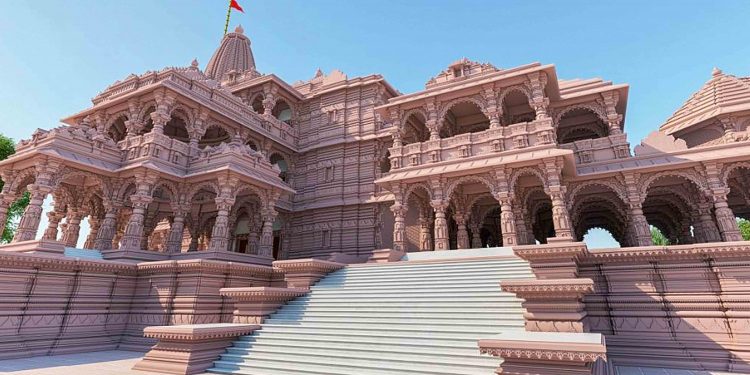New Delhi: For the BJP which was once forced to keep the ‘contentious’ Ram temple issue aside to woo allies, the beginning of construction of a grand temple in Ayodhya is an ideological victory over its rivals with even many opposition leaders welcoming the development.
Incidentally, the ground-breaking ceremony by Prime Minister Narendra Modi for the temple’s construction, in the presence of leading lights of Hindutva movement including RSS chief Mohan Bhagwat, will be conducted Wednesday which coincides with the first anniversary of the annulment of Article 370, another key ideological plank for the saffron party.
It is only fitting, political watchers say, that Prime Minister Modi and Uttar Pradesh Chief Minister Yogi Adityanath will be the main political presence at the ground-breaking event, as both are known for their uncompromising commitment to the Hindutva cause.
Notably, Modi as a national office-bearer in the BJP played an important role in LK Advani’s ‘Ram Rath Yatra’ in 1990 while Adityanath’s late guru Mahant Avaidyanath headed the group of sadhus and Hindu organisations that was formed in 1984 to spearhead the temple movement.
If the Supreme Court’s verdict in November, 2019 in favour of building the temple at the site, where believers hold that Lord Ram was born, put a legal closure to the historical dispute between Hindu and Muslim groups, the beginning of its construction is likely to further consolidate Hindutva sentiments.
“For us, the Ayodhya issue had ceased to be a political issue long back. It was always a matter of faith for us, and our manifestoes in all general elections underlined our commitment to build the temple and also scrap Article 370. But, of course, now that both promises have been fulfilled, we will talk about them,” a top BJP leader said here Tuesday.
Though it was Vishwa Hindu Parishad (VHP) under late Ashok Singhal which conceptualised the Ram Janmbhoomi movement in 1984 and began mobilising sadhus and Hindu groups nationwide, the issue gained political currency like never before after the then BJP president Advani started his ‘Ram Rath Yatra’ in 1990.
This had followed the party’s decision to come out openly in support of the temple’s construction, where the Babri mosque stood at that time before being brought down by frenzied kar sevaks in 1992, in its national executive meeting in Palampur in 1989.
Advani launched his famous ‘Rath Yatra from Somnath temple in Gujarat, drawing people in thousands as his chariot rolled through the India’s heartland, at times triggering communal riots as well, while the movement gained momentum.
The demolition of Babri Masjid at the disputed site December 6, 1992 made the party a pariah in politics for a while but could not stop its rise to power.
A day before the beginning of the temple’s construction, Congress leader Priyanka Gandhi Vadra hoped that the ground-breaking ceremony of the Ram temple in Ayodhya becomes a ‘marker’ of national unity, brotherhood and cultural harmony. She said for ages Lord Ram’s character had served as a source of unity for the entire Indian sub-continent.







































